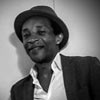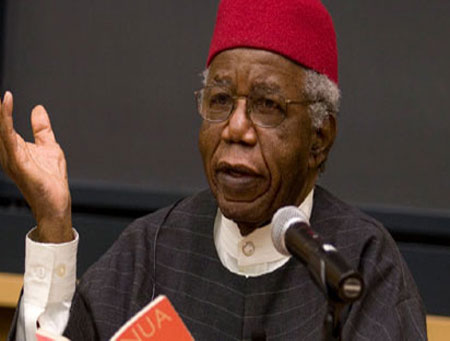Twitter: @eAlanki
Luckily for me, no one ever called me Unoka — Okonkwo’s notorious slothful father in Achebe’s Things Fall Apart.
In his lifetime, Unoka did nothing but drink palm wine, eat cola nuts, sing his miserable soul to the devil and accumulate debtS. Perhaps his debts were so high that even if he had been given the chance of another lifetime, working 24 hours a day to pay off his debts, he still would have died indebted.
Okonkwo walked as though he had springs fitted in his legs. Only a teenager, he successfully wrestled against Amalize The Cat — the greatest wrestler in Umuofia and beyond. A grown man, Okonkwo sired over a dozen children with three wives and had a lot of yams to show for his labour, wealth and success. How then could Okonkwo — a man of achievement, a manly man — not be ashamed of his own father?
In secondary school, Unoka became our moniker for a-good-for-nothing someone. And if you were an ‘Unoka’, be sure to kiss goodbye to your real name. We made sure you knew by calling out at the top of our voices when and wherever you presented yourself. On the other hand, if you were an ‘Okonkwo’, which indeed was a very rare achievement — certainly you were someone who could eat hot steel. Indeed you could have been as tough as anything.
Despite Okonkwo’s bravado, his burden was as haunting as it was all at once humiliating — not a fate I wished for myself. How could he have killed Ikemefuna, his son in every sense, in the name of manliness?
To have read Things Fall Apart between the experimental ages of eleven and fourteen is marveling. Its psychological firmness, using the Igbo culture as a premise for demystifying the ideology cemented by the racist colonialists that Africans were a lost and hopeless race, was not something my young mind could grapple with and understand. The world to me was simple and straightforward — humanity was good, progressive and supportive of each other.

Certainly it was this simplicity of thought that led to my hating Things Fall Apart at the time. Recently, I brought myself together and re-read the book, after breezing through Ben Okri’s atmospheric Famished Road and venturing into Chimamanda Ngozi’s beautiful Half Of A Yellow Sun. The latter authors are remarkable in their own right, but to think that Chinua Achebe wrote Things Fall Apart, the classic of African literature, when he was in his twenties is a spectacle that I find quite daunting, if not frightening. To think that such a young man could write anything so profoundly emotional and void of melodrama, left me wheezy. Achebe wrote like a twenty-eight year old with the experience of a sixty-year old.
Which brings me to why I didn’t quite like Things Fall Apart as a boy. At the time of first reading this book, I had no idea that it had already become a world sensation — that while I was sitting there twitching my face in a dust-coated classroom in a remote corner in Cameroon, students of a similar age, but in sparkling classrooms in the US and the world over were taking on the same giant. My experience is that most of them found the book boring too, all which changed after a second read as adults.
Good literature does not simplify events in other to entertain and make mockery of people, it informs on the depth of our ordinariness and requires more than an average child’s mental disposition to appreciate. This is what Achebe’s Things Fall Apart does to me. This is what it achieves in the telling of Okonkwo’s tragic tale — highlighting our shared vulnerabilities and cravings for fame and success. We may realize all our dreams yet remain mortal humans.
At present, Achebe defines African literature. His narrative marries the Igbo language to English, weaving out an aesthetic novelty that is quite enchanting to read — possible because he grew up in a community whose values were entrenched in what I can generalize as its African core. His exposure brought out the authentic voices and wisdom of his people, which was an intrinsic part of himself.
In as much as I venerate Achebe, I cannot write in his style. Not because I don’t want to. Simply, I am not equipped with the same tools. I grew up in another era, one where I was exposed to different sensibilities, which constitute my writing foundation. For instance, my command of my own native language is weak, if not none-existent. My view of the world is perhaps broader — having been fortunate to visit many foreign countries before thirty, residing in three on three continents. With present-day communication technologies in place and remarkable ease of travel — pure Africanism, Europeanism or Americanism, is a new myth. I see a situation where African literature will soon grow to encompass the stories of Africans and their offspring thrown to far-flung corners of the globe, if not already. Roots is an African story written by an African American, Alex Haley. Does this make this story less African? I don’t think so, but there are those who will argue to the contrary.
Regardless, as we move from post-colonial African writing towards modern scenarios, the measure put in place by Achebe in his colossal Things Fall Apart, presently translated into some fifty languages, will for a long time remain the yardstick for assessing successful African writing.
Available on Amazon
 Ernest Alanki writes short stories, poems and novel length fiction. His works have appeared or will soon feature in The Journal of Microliterature, DUNIA Magazine and The American Mensa ltd., Writer’s Magazine (Calliope), Big Stupid and Ngoh Kuoh Reviews. Now a Swedish citizen, he lives and works as an academician in Stockholm. His first novel Chocolate Shop Perverts was published by HopeRoad Publishing.
Ernest Alanki writes short stories, poems and novel length fiction. His works have appeared or will soon feature in The Journal of Microliterature, DUNIA Magazine and The American Mensa ltd., Writer’s Magazine (Calliope), Big Stupid and Ngoh Kuoh Reviews. Now a Swedish citizen, he lives and works as an academician in Stockholm. His first novel Chocolate Shop Perverts was published by HopeRoad Publishing.
Also by Enest Alanki

